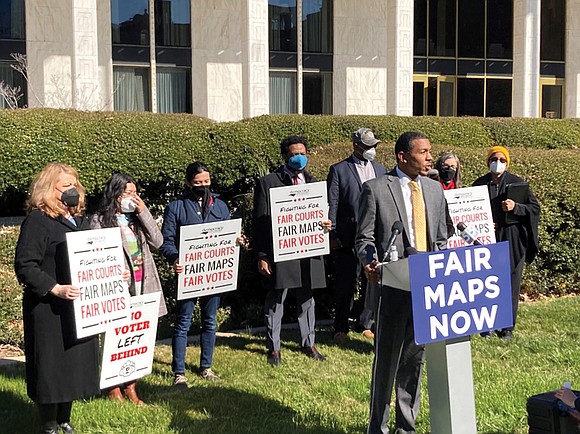Supreme Court rejects GOP argument in North Carolina case that could have transformed U.S. elections
Associated Press | 6/29/2023, 6 p.m.

WASHINGTON - The Supreme Court ruled Tuesday that state courts can curtail the actions of their legislatures when it comes to federal redistricting and elections, rejecting arguments by North Carolina Republicans that could have dramatically altered races for Congress and president in that state and beyond.
The justices by a 6-3 vote upheld a decision by North Carolina’s top court that struck down a congressional districting plan as excessively partisan under state law.
The high court did, though, indicate there could be limits on state court efforts to police elections for Congress and president, suggesting that more election-related court cases over the issue are likely.
Chief Justice John Roberts wrote for the court that “state courts retain the authority to apply state constitutional restraints when legislatures act under the power conferred upon them by the Elections Clause. But federal courts must not abandon their own duty to exercise judicial review.”
The decision was the fourth major case of the term in which conservative and liberal justices joined to reject the most aggressive legal arguments put forth by conservative state elected officials and advocacy groups. Earlier decisions on voting rights, a Native American child welfare law and a Biden administration immigration policy also unexpectedly cut across ideological lines on the court.
Major rulings are expected by Friday on the future of affirmative action in higher education, the administration’s $400 billion student loan forgiveness plan and a clash of religious and LGBTQ rights.
The practical effect of Tuesday’s decision is minimal in North Carolina, where the state Supreme Court, under a new Republican majority, already has undone its redistricting ruling. Another redistricting case from Ohio is pending, if the justices want to say more about the issue before next year’s elections.
Justices Samuel Alito, Clarence Thomas and Neil Gorsuch would have dismissed the North Carolina case because of the intervening state court action.
Vice President Kamala Harris said in a statement that the decision “preserves state courts’ critical role in safeguarding elections and pro- tecting the voice and the will of the American people.” The Democratic administration defended the power of state courts in the case.
Former President Barack Obama, in a rare public comment on a court decision, applauded the outcome as “a resounding rejection of the far-right theory that has been peddled by election deniers and extremists seeking to undermine our democracy.”
At the same time, the leader of a Republican redistricting group said he was pleased the court made clear there are limits on state courts. The decision “should serve as a warning to state courts inclined to reach beyond the constitutional bounds of judicial review. This is a first, positive step toward reining in recent overreaches of state courts,” Adam Kincaid, president and executive director of the National Republican Redistricting Trust, said in a statement.




